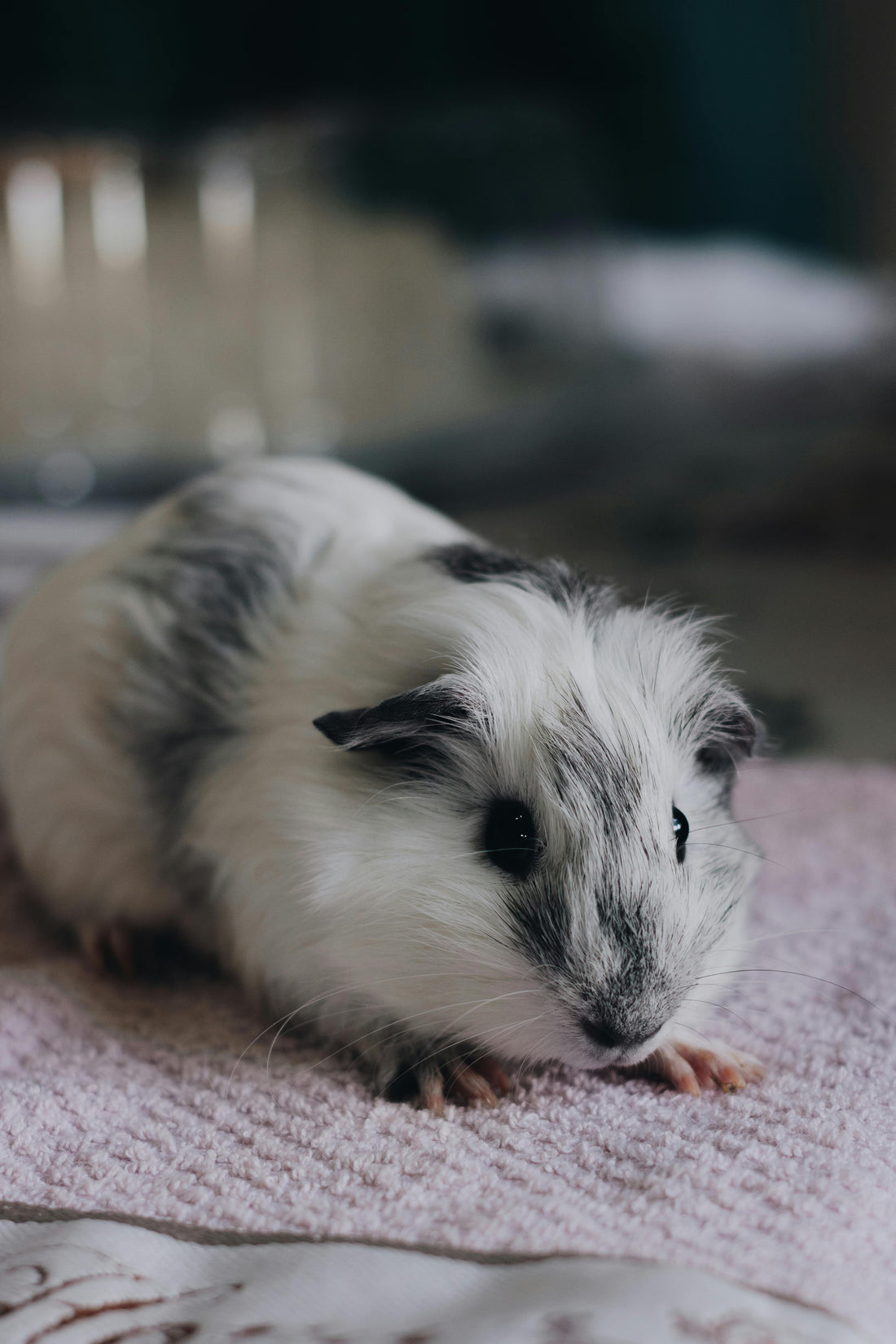
Essential Tips for Caring for Your Guinea Pig: Health, Diet, and Enrichment
Share
Guinea pigs make wonderful pets—affectionate, playful, and relatively easy to care for. However, like all pets, they require specific care to live happy, healthy lives. From diet to habitat to socialization, there are several key factors to consider in guinea pig care that ensure they thrive. In this comprehensive guide, we’ll cover the most important aspects of guinea pig care, from their diet and health needs to mental and physical enrichment, so your guinea pig can live its best life.
1. Understanding Guinea Pig Health: Regular Care is Essential
Guinea pigs, like all animals, have their own unique health needs. Keeping them healthy requires regular veterinary visits and awareness of potential health issues.
Common Health Concerns for Guinea Pigs:
- Dental Problems: Guinea pigs have continuously growing teeth, and they need to chew on hay, vegetables, and other safe items to wear down their teeth. If their teeth become overgrown, it can cause pain and difficulty eating.
- Urinary Issues: Guinea pigs are prone to urinary tract infections and bladder stones, especially if their diet lacks sufficient fiber or if they don’t drink enough water.
- Respiratory Infections: Guinea pigs are sensitive to respiratory issues, often caused by drafts or poor ventilation. Always keep their habitat in a warm, draft-free area.
- Obesity: Like other pets, guinea pigs can become obese if they are overfed or not given enough room to exercise.
Prevention Tips:
- Schedule regular veterinary check-ups, especially if you notice any unusual behavior, weight loss, or changes in their eating or drinking habits.
- Ensure a clean, dry living environment to minimize the risk of respiratory problems.
- Provide chew toys and fresh hay to keep their teeth healthy and to encourage natural chewing behavior.
2. Diet: The Cornerstone of a Healthy Guinea Pig
A proper diet is one of the most important factors in your guinea pig’s health. They are herbivores and need a varied diet that includes high-quality hay, fresh vegetables, and vitamin C-rich fruits.
The Essential Components of a Guinea Pig’s Diet:
- Hay: Hay should make up the majority of your guinea pig’s diet. Timothy hay, meadow hay, and orchard grass are great options. Hay provides fiber that aids in digestion and helps keep teeth trimmed.
- Fresh Vegetables: Dark leafy greens like kale, parsley, and cilantro are excellent for guinea pigs. Avoid iceberg lettuce, which has little nutritional value and can upset their stomach.
- Fruits: Fresh fruits, such as apples (without seeds), strawberries, and blueberries, can be offered in moderation as a treat.
- Pellets: Choose high-quality, plain guinea pig pellets that contain vitamin C. Guinea pigs cannot produce their own vitamin C, so it’s vital to provide it either through fresh vegetables or supplements.
- Water: Fresh, clean water should always be available. Guinea pigs can drink a lot of water, so ensure their water bottle is always full.
Tip: Avoid feeding guinea pigs sugary or fatty foods. Also, avoid seeds or nuts, as they can lead to choking or digestive problems.
3. Housing: The Right Environment for Your Guinea Pig
Guinea pigs need space, comfort, and security. A spacious and clean environment is essential for their physical and mental health.
Setting Up the Perfect Habitat:
- Cage Size: A minimum of 7.5 square feet of space is recommended for one guinea pig, with extra space for additional guinea pigs. Larger cages are always better to allow them room to roam and exercise.
- Bedding: Use absorbent bedding such as paper bedding or fleece liners. Avoid cedar or pine bedding, as the oils can cause respiratory issues.
- Hideouts: Guinea pigs are prey animals, so they need places to hide and feel secure. Provide tunnels, small houses, or cardboard boxes where they can retreat when they need privacy or rest.
- Exercise Area: In addition to their cage, guinea pigs benefit from supervised time outside the cage to run around in a safe space. This helps prevent obesity and keeps them mentally stimulated.
Tip: Clean your guinea pig’s cage regularly, at least once a week, and spot clean daily to remove waste. A clean environment promotes health and reduces stress.
4. Socialization and Mental Stimulation: Keeping Your Guinea Pig Happy
Guinea pigs are social animals and thrive in the company of others. They enjoy interacting with their owners, and, in many cases, another guinea pig makes a great companion.
Socializing Your Guinea Pig:
- Companionship: It’s recommended to keep guinea pigs in pairs or small groups, as they are naturally social. However, make sure to introduce new guinea pigs slowly and monitor interactions to prevent territorial behavior.
- Handling: Guinea pigs love affection, but they don’t enjoy being picked up suddenly or held for long periods. Approach them gently, and let them come to you. Spending time sitting with them on the floor can help build trust.
- Toys and Enrichment: Guinea pigs need mental stimulation to stay happy. Offer chew toys, tunnels, and even cardboard boxes to explore. They enjoy activities that allow them to forage for food or puzzle toys that stimulate their natural instincts.
Tip: Provide daily playtime outside of their cage to explore safe areas. This helps keep them active and engaged.
5. Grooming and Care: Keeping Your Guinea Pig Clean
While guinea pigs are naturally clean animals, regular grooming is essential to ensure they maintain a healthy coat and avoid issues like matting or skin irritation.
Grooming Tips:
- Brushing: Short-haired guinea pigs generally require less grooming, but long-haired guinea pigs need regular brushing to prevent mats and tangles. Brush them at least once a week, or more often if their hair becomes tangled.
- Nail Clipping: Guinea pigs’ nails grow quickly and need to be trimmed every 3-4 weeks. Be careful not to cut too close to the quick, which can cause bleeding.
- Bathing: Guinea pigs don’t need regular baths unless they become particularly dirty. Use a pet-safe shampoo if necessary.
Tip: Regular grooming not only helps with cleanliness but also strengthens the bond between you and your guinea pig.
Owning a guinea pig is a rewarding experience that comes with responsibilities. By providing a proper diet, a clean and spacious environment, and plenty of social interaction and mental stimulation, you can help your guinea pig live a long, healthy, and happy life. Remember, guinea pigs are not just cute little creatures; they need your attention, care, and love to thrive. So, take the time to ensure their well-being, and you’ll be rewarded with a loyal, playful companion for years to come.
